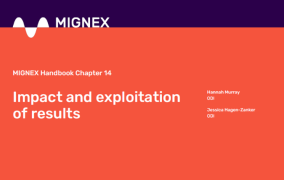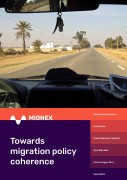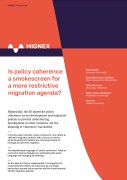News
End-User-Panel annual survey – Takeaways from the fifth round
Since the summer of 2019, we've asked the MIGNEX End User Panel for feedback in an annual survey. Here, we reflect on the findings of the fifth survey; considering how the practical relevance of MIGNEX research has changed over time.
Who are our EUP members?
The End-User Panel (EUP) is comprised of members of the policy community, academia, civil society and private sector who work in the migration space.
The panel was establised at the beginning of the MIGNEX project in 2019. As of 2023, there are 182 members. Nearly half of them work in academia, and around 40% are either part of the civil society, international organizations or local or national government agencies; while a smaller proportion (around 3%) are in the private sector or part of European institutions. Our EUP members work in 52 countries, almost half of whom in institutions based in the 'Global South'.
How are EUP members using MIGNEX research?
We asked respondents about their usage of MIGNEX outputs. Bearing in mind that this year only 21 members took part in the survey, compared to 65 in the first year, we reflect on how the EUP’s opinion on the practical relevance of MIGNEX research has changed in the last five years. Here are the key takeaways:
- Generating empirical evidence continues to be the most valuable aspect of MIGNEX. What users find the most useful is the empirical evidence that is generated (91%), followed by analyses across multiple countries (76%), country-specific analysis (71%). The proportion of members who considers new empirical evidence as the most valuable output increased from 77% in 2022 to 91% in 2023, reflecting the substantial increase in the number of research pieces published in the last year.
- The value that EUP members receive from different aspects of MIGNEX translates into more frequent usage of MIGNEX outputs. From 2019 to 2023, reading MIGNEX research pieces is the most common usage of MIGNEX outputs. Other uses also became more common in 2023 compared to 2019 such as guiding the content of policy documents (38% of respondents) and referencing or citing MIGNEX findings in own outputs (24%). Variations in output usage reflect how the MIGNEX project has evolved over the years from the initial stage of data collection to the dissemination findings, including Policy Briefs.
You can find the report with full findings of the 2023 survey, here



